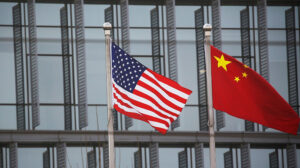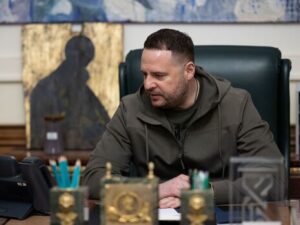
The national security adviser, Jake Sullivan, will raise thorny issues like Taiwan and Russia with only months left before a new administration takes office.
Making another heavy push to work with China in the waning months of the Biden administration, Jake Sullivan arrived in Beijing on Tuesday for talks aimed at showing that the United States and China can manage their differences.
The U.S. national security adviser began his fifth meeting in less than 18 months with China’s top foreign policy official, Wang Yi, as the Biden administration seeks to reinforce its strategy on China despite uncertainty over the future of American foreign policy.
There is much to talk about — but probably little on which they will agree.
Mr. Sullivan plans to discuss working with China on limiting the spread of fentanyl and expanding high-level military contacts. He will also stress the United States’ position on Taiwan and its concerns about China’s support of Russia.
China indicated it would raise its own objections during the talks — including over America’s support for Taiwan, the island democracy Beijing claims, and U.S. controls on exports of technology to China.
Beijing wants the United States to ease its pressure on China, in the hope that it would set the tone for smoother relations with the next U.S. administration, analysts said.
“China’s priority is to maintain the stability of China-U.S. relations in the last several months of Biden’s presidency,” said Zhao Minghao, an expert on U.S.-China relations at Fudan University in Shanghai.
The prospect of a potential meeting between President Biden and China’s leader, Xi Jinping, before Mr. Biden’s term ends, is likely to come up. (It was unclear if Mr. Sullivan would meet with Mr. Xi during his three-day visit.)
Here are some of the issues Mr. Sullivan and Mr. Wang are expected to broach:
Taiwan and Ukraine
Perhaps the biggest flash points in relations between China and the United States are Russia’s war in Ukraine and China’s increasing aggression toward Taiwan.
Mr. Sullivan is likely to urge China to reduce its support to Russia, which the United States and NATO say has helped sustain Russia’s war effort, now in its third year. China buys huge quantities of Russian oil and supplies Russia with dual-use technology that can be applied to the battlefield, U.S. officials say.
Beijing is unlikely to turn its back on Moscow, its only major-power partner in counterbalancing the United States.
Chinese officials will seek to criticize U.S. support for Taiwan, which Mr. Xi has threatened to take by force, if necessary. Beijing accuses Washington of promoting “Taiwan independence” by supplying the island with arms and allowing for exchanges between American and Taiwanese officials.
China said in a statement on Sunday that the United States needed to do more to repair relations. “The United States has kept containing and suppressing China,” a foreign ministry statement said. The relationship, it said, is “still at a critical juncture of being stabilized.”
Taiwan was “the first and foremost red line that must not be crossed,” the statement read.
Technology Controls
Mr. Sullivan has championed the Biden administration’s export controls designed to prevent China from getting its hands on advanced American semiconductors, or microchips, that can be used to develop weapons or computing power that could threaten U.S. national security.
That has frustrated China, which has struggled to catch up with the United States in designing advanced chips despite investing billions of dollars in research. Beijing says the export controls are aimed at stunting China’s rightful development.
The restrictions, which were first introduced in October 2022, have had far-reaching consequences by forcing countries to shift, or consider shifting, some production of semiconductors out of Asia back to North America and Europe.
It is unclear what the long-term implications of U.S. export controls will be. China has seized on the restrictions to redouble efforts to become more technologically self-sufficient. Brokers have also used proxies to smuggle banned chips into China.
Will Xi and Biden Meet Again?
Mr. Sullivan’s visit could lay the groundwork for one last summit between Mr. Xi and Mr. Biden. Discussions between Mr. Sullivan and Mr. Wang were key to organizing last November’s meeting.
Though he will only serve one term, and one that was disrupted by the Covid pandemic, Mr. Biden could be the first president not to travel to China since President Carter.
Mr. Biden has visited China before, when he was vice president in 2011, a trip remembered for his stop at a local Beijing restaurant for noodles and dumplings. If a state visit is not possible, Mr. Xi and Mr. Biden could potentially meet at the APEC summit in Peru in November.
Of course, China may not be interested in Mr. Biden’s lame duck presidency and could be focused on how best to approach the next administration. Writing in Foreign Affairs magazine this month, the Chinese international relations scholars Wang Jisi, Hu Ran and Zhao Jianwei said Beijing sees little difference between a Trump or Harris administration; they will both be driven by domestic pressure to be tough on China.
“Beijing is preparing itself for the outcome of the U.S. elections with great caution and limited hope,” they wrote.
Source: https://www.nytimes.com/2024/08/27/world/asia/sullivan-biden-china-xi.html

Head of the Office of the President Andrey Yermak in a telephone conversation discussed with Jake Sullivan, national security adviser to the US President, further support for Ukraine as it approaches the anniversary of Russia’s full-scale invasion, the Presidential Press Service reported.
“The two sides discussed the strong support the United States will continue to provide to Ukraine as the anniversary of the war approaches, and also noted the importance of our continued communication,” the statement said.
Also, the head of the Office of the President informed the American side about the current situation on the front.
Additionally, Yermak thanked the American people, the US president and both houses of Congress for supporting Ukraine.